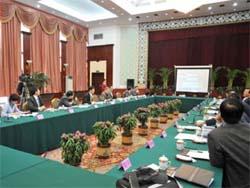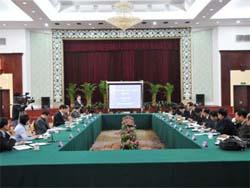

On November 11, WANG Lequan, member of Political Bureau of the CPC Central Committee and Secretary of the Party's Committee in Xinjiang, holds talks with CAS Vice President Li Jinghai on the initiation of a strategic development planning study for the development of the local coal chemical industry.
CAS and the government of the Xinjiang Uygur Autonomous Region have decided to start a strategic development planning for the development of the local coal chemical industry.
On November 11, WANG Lequan, member of Political Bureau of the CPC Central Committee and Secretary of the Party's Committee in Xinjiang, held talks with Vice President of the CAS Li Jinghai on the research in Urumqi, capital of the region.
Although the proven reserves of coal in Xinjiang are about 2,000 billion tons, roughly accounting for 40% of the national total, its annual output of coal is only 80 million tons, or 5% of the national yield. To take advantage of the fecund natural resources, the Xinjiang government has put emphasis on the coal chemical industry in its development plan.
Last October, upon the invitation of the Xinjiang government, researchers with the CAS Dalian Institute of Chemical Physics and other institutes drew a blueprint for manufacturing the synthesized natural gas (SNG) via coal gasification and methanation.
To solicit ideas on the initiation of a project on strategic planning for the coal chemistry development in the region, the CAS delegation headed by Prof. Li Jinghai came to Urumqi to hold discussions with the regional leaders.
In order to promote the SNG industry in Xinjiang, Prof. Li made four suggestions. First, the CAS Academic Divisions would organize CAS Members to carry out a consulting project on the issue. Second, CAS will start research projects to tackle key issues in developing new catalysts and new techniques for industrial use. Third, efforts will be accelerated to build a pilot SNG facility with a production capacity up to 120,000m3 per day. Finally, a technical planning will be implemented for the SNG manufacturing in the region.
.





